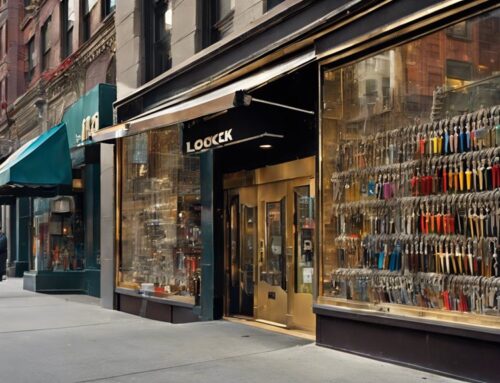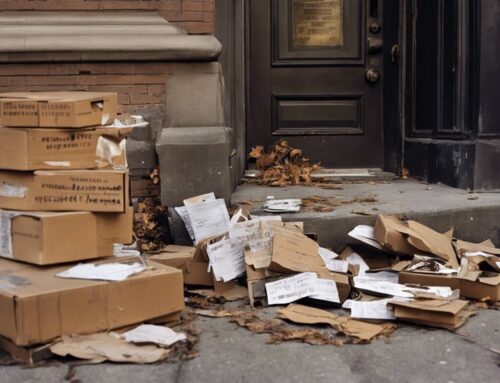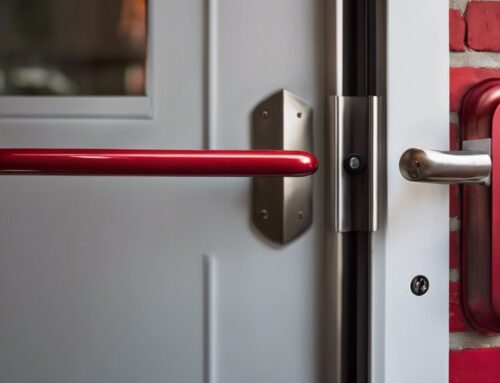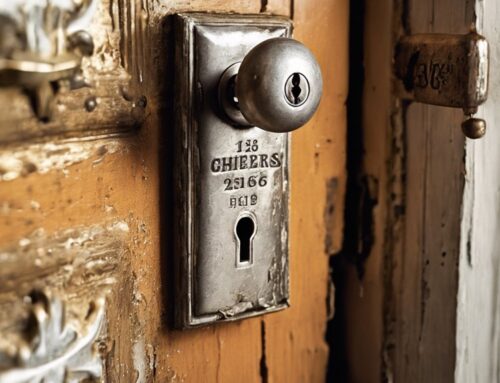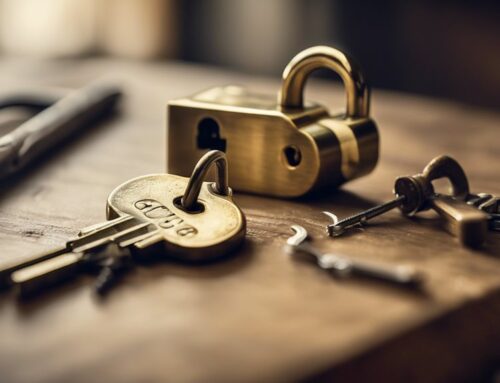Did you know that nearly 30% of locksmiths report facing legal challenges at some point in their careers? As a professional in this field, you need to be aware of the various liability and legal risks that could impact your business. Understanding licensing requirements and insurance coverage is just the beginning. What specific strategies can you implement to protect yourself and your livelihood from potential lawsuits?
Key Takeaways
- Obtain a valid locksmith license in NYC, including necessary documentation and background checks, to comply with local regulations and mitigate legal risks.
- Secure comprehensive liability insurance tailored to locksmithing needs, covering general and professional liabilities, property damage, and employee dishonesty.
- Maintain detailed records of all locksmith services performed, including client information and authorization, to protect against disputes and legal claims.
- Implement risk management strategies like liability waivers, clear client communication, and regular staff training on legal obligations to minimize liability risks.
- Regularly review and update insurance policies and compliance practices to adapt to changing regulations and ensure continued protection against legal risks.
Importance of Liability Insurance
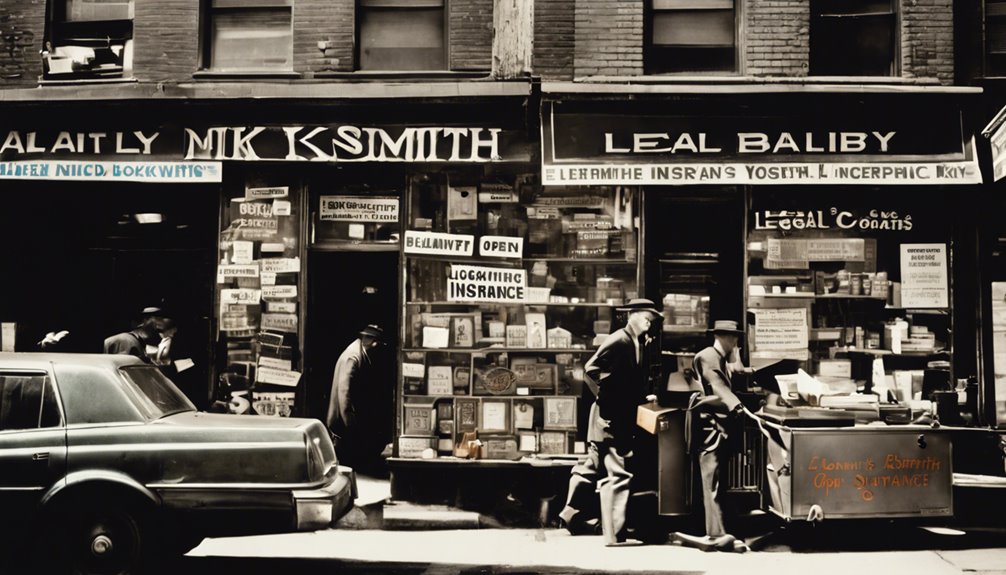
Liability insurance is fundamental for locksmiths in New York because it provides essential financial protection against various risks you may face in your line of work. Your business is subjected to lawsuits involving claims of bodily injury and property damage, which can quickly escalate into significant financial burdens. By securing liability insurance, you shield yourself from potential financial losses, covering legal expenses and settlements that arise from such cases. Furthermore, operating as an unlicensed locksmith exposes you to serious legal repercussions, which can add to your financial risks. Additionally, understanding employment laws specific to locksmiths in New York can further guide your insurance needs and responsibilities.
Moreover, maintaining compliance with regulations is important. Many contracts or job sites require proof of liability insurance before you can even commence work. This coverage not only elevates your professional credibility but also guarantees adherence to industry standards, making you a trustworthy option for clients.
Liability insurance covers diverse risks, including general liability for third-party injuries and damages, professional liability for any errors or omissions, and commercial property insurance for safeguarding your premises and tools. This all-encompassing approach not only mitigates the impact of unforeseen incidents but also guarantees that your business continuity isn't compromised by a single lawsuit. Additionally, having insurance is essential for maintaining business stability and trust with your clients.
The flexibility of policies allows you to tailor coverage options specifically to your locksmith business's needs. You can choose from various payment plans, making it feasible to obtain the necessary coverage without financial strain.
With options for additional insureds and certificates at no extra charge, liability insurance represents a strategic move in protecting your livelihood while allowing you the freedom to operate confidently in New York's dynamic market.
Common Liability Risks
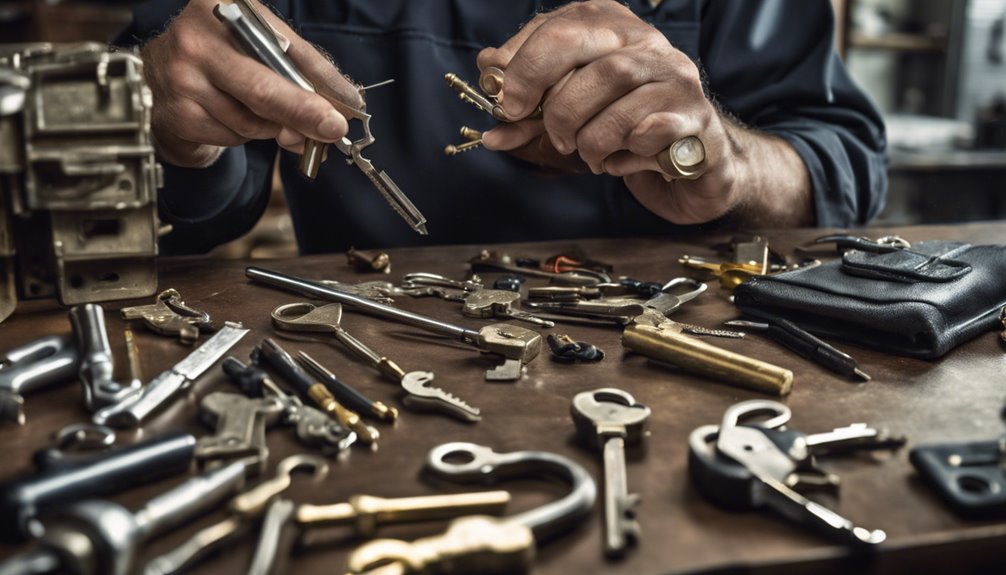
As a locksmith in New York, you face several common liability risks that can jeopardize your business and finances. One major risk is third-party property damage. Accidental damage during lock installations or repairs can result in significant financial claims, whether you've scratched a client's car or damaged a window mechanism while providing emergency service. Having general liability insurance can mitigate these risks. Additionally, being aware of your role in eviction procedures can help ensure you adhere to legal guidelines and minimize liabilities. It is important to know that changing locks after eviction requires compliance with specific state laws to avoid legal repercussions.
Another concern is the loss of valuables, where negligent handling of keys or misplacing items could lead to theft or loss for your clients. This raises your liability, and you may need employee dishonesty coverage to address any internal theft issues that arise.
Third-party bodily injury is also a risk. If a customer or bystander gets injured due to your services—perhaps slipping on tools you've left on-site—you may face legal claims for medical expenses or lost wages. Customized locksmith insurance is crucial for minimizing these potential claims.
Lastly, incomplete or faulty work poses another liability. If you fail to meet client expectations, you risk compromised security and damaging your reputation. Errors and omissions (E&O) insurance can cover potential professional oversights, which shields you from legal fees related to inadequate service.
Understanding these common risks can empower you to implement measures that protect your business and clients alike.
Balancing freedom and responsibility in your locksmithing operations is essential for sustained success in New York.
Licensing Requirements in NYC

To operate as a locksmith in New York City, you'll need to navigate specific licensing requirements set by the Department of Consumer and Worker Protection (DCWP). A valid locksmith license is mandatory in this field, ensuring you comply with the state's regulations. It is essential to be aware that navigating specific legal restrictions is crucial for locksmiths in New York. Obtaining this license reflects your commitment to professional standards in the locksmithing industry.
You can submit your application online or in person at the DCWP Licensing Center or NYC Small Business Support Center. Be prepared to provide proof of your qualifications, such as certificates from licensed locksmiths or training from a New York State education-licensed school.
Additionally, you must present a photo ID and a color passport photo, while payment of the license fee—which varies depending on your application timing—is also necessary. The fee ranges from $25 to $100, influencing the validity of your license, which can span from six months to thirty months.
All applicants undergo fingerprinting and a criminal background check to verify eligibility.
Once licensed, maintaining records of your work is essential; it includes client information and proof of ownership. You'll need to present your license upon request, particularly for itinerant work. Furthermore, having a license allows you to provide a wider range of legitimate security services compared to unlicensed individuals.
Finally, remember that it's illegal for unlicensed individuals to provide locksmith services, and you must have clients acknowledge their requests officially.
Steps to Mitigate Liability

Mitigating legal risks as a locksmith in New York requires a proactive approach that incorporates legal protections, thorough documentation, clear communication, and adherence to safety standards. Ensuring ADA compliance is also essential to accommodate all clients, particularly those with disabilities.
By employing effective strategies, you can greatly reduce your liability exposure.
- Incorporate liability waivers to set limitations on claims and damages.
- Maintain detailed records of services provided to protect against disputes.
- Communicate risks clearly to clients, establishing transparent expectations.
Start by drafting solid liability waivers and disclaimers, outlining the limits of your responsibility. This step is fundamental for services that carry inherent risks, like safe installations.
Confirm your employment contracts adhere to labor laws to avoid wrongful termination claims.
Documentation is equally essential. Always require proof of ownership before providing services and retain detailed records of every job, including dates and materials used.
Store these records securely to defend against potential claims.
Effective communication with your clients also plays an important role. Providing clear and concise written estimates helps set the scope of services and manage expectations.
Additionally, obtaining written authorization from owners before commencing work on high-value items protects you from unauthorized claims.
Lastly, adhering to stringent operational and safety standards can prevent accidents and property damage, particularly in relation to choosing compliant locks that meet New York's fire codes.
Confirm your team is well-trained and certified, follow best practices, and maintain a safe working environment. Prioritizing accessibility through ADA compliance ensures that all clients can access your essential services without barriers.
Understanding Insurance Coverage

When considering insurance coverage for your locksmith business, it's essential to evaluate the various options available to you. Each type of policy offers distinct protections, but understanding common exclusions is equally important to guarantee you're fully covered. Additionally, it's crucial to be aware of how legal factors can influence your insurance needs as a locksmith in New York State. For instance, working with a 24-hour locksmith service often requires emergency services coverage to protect against potential liabilities during urgent callouts.
Coverage Options Available
Understanding the various insurance coverage options available is vital for locksmiths in New York, as these protections not only shield you from potential financial losses but also guarantee compliance with industry standards and client expectations.
Here are some key coverage options you should consider:
- General Liability Insurance: This covers third-party bodily injury and property damage claims, essential for maintaining contracts with building owners who might require a minimum of $1 million in coverage.
- Commercial Property Insurance: Protects your business location and its contents from theft, fire, and vandalism, assuring you're compensated for lost income during repairs.
- Tools and Equipment Insurance: Important for covering the costs of repairing or replacing your tools, this guarantees uninterrupted service for your clients.
Beyond these, you may also explore Commercial Auto Insurance for business vehicles and Professional Liability Insurance to mitigate risks associated with negligence.
Common Exclusions Explained
While you may feel confident in the insurance coverage you've selected for your locksmith business, it's crucial to recognize that specific exclusions can impact your liability protection. Common exclusions often include on-the-job injuries to your employees, which necessitate separate Workers Compensation insurance.
Likewise, injuries to independent contractors or their employees typically fall outside general liability policies, especially in excess lines.
You'll also find that professional services errors—such as mistakes in alarm installation—are excluded from standard liability coverage, underscoring the necessity for Errors & Omissions (E&O) insurance. This separation avoids overlaps and guarantees the right policy addresses the unique risks you face.
Additionally, if you operate vehicles for business purposes, you're required to secure a Business Auto Policy, as general liability doesn't cover auto-related risks.
Similarly, damage to your commercial property will need specific Commercial Property Insurance.
Lastly, specialized risks like pollution liabilities or contractual disputes may also be excluded, requiring additional coverage. Understanding these exclusions allows you to tailor your insurance strategy, providing complete protection for your locksmith business.
Exclusions in Liability Policies

Numerous exclusions exist in liability policies that locksmiths in New York need to be aware of to protect themselves effectively. Understanding these exclusions helps you avoid unexpected financial burdens and guarantees you maintain your business's integrity. Here are key exclusions to reflect on:
- On-the-job injuries to employees are typically covered under Workers Compensation, not general liability.
- Professional services and errors might require specific coverage like Errors & Omissions insurance.
- Liability for subcontractor actions can often present gaps, exposing you to potential risks.
While general liability protects against standard risks, its limitations can create vulnerabilities for your business. For example, injuries sustained by subcontractors usually aren't covered, opening the door to legal ramifications should an incident occur.
You might think you're adequately protected under a general liability policy, but any claims resulting from your subcontractors' negligence could leave you without coverage.
Additionally, property-related risks such as cyber breaches or tools and equipment damage are outside your general liability policy, necessitating the acquisition of specialized insurances. This reliance on alone can jeopardize your financial security should anything go amiss.
In this ever-evolving industry, staying informed on your policy's exclusions isn't just prudent; it empowers you to make decisions benefiting your business, your clients, and your peace of mind.
Take the necessary steps to understand these gaps and expand your coverage accordingly.
Variations in Licensing Requirements

When operating as a locksmith in New York, you must navigate various state-specific regulations that dictate licensing requirements.
Understanding the nuances of background check requirements and licensing fee structures is essential for compliance and successful practice.
Ignoring these variations could expose you to significant legal risks and complications.
State-Specific Regulations
Licensing requirements for locksmiths in New York highlight significant state-specific regulations that vary particularly by jurisdiction. While the entirety of New York State doesn't mandate locksmith licensing, New York City enforces strict rules through its Department of Consumer Affairs (DCA).
Understanding these distinctions is vital if you want to operate legally and protect yourself from potential legal pitfalls.
- Applications must be submitted via an online platform or in-person.
- Documentation includes a photo ID, current passport photo, and proof of qualifications.
- Training is essential; apprentices must have a trainee-license and work under supervision.
Compliance with federal, state, and city laws is non-negotiable, and you must adhere strictly to the DCA's requirements. This includes not only license fees that range from $25 to $125 but also meeting specific qualifications from licensed entities.
Be mindful, too, that while other cities may not have stringent licensing requirements, New York City does. As a result, staying informed about regulations specific to your jurisdiction is key to your locksmithing success.
Neglecting these nuances can expose you to liability and risks that could have easily been avoided.
Background Check Requirements
To guarantee public safety and maintain the integrity of the locksmith profession, New York City mandates thorough background checks for all locksmith license applicants. You'll need to submit your fingerprints at the Department of Consumer Affairs (DCA) Licensing Center, accompanied by a $75 processing fee. These checks include both state and federal database reviews, ensuring a detailed evaluation.
When evaluating criminal history, the DCA considers factors like the seriousness of the offense and the time elapsed since it occurred. Don't worry; prior convictions won't automatically disqualify you; each case is reviewed individually. However, failing to disclose any past convictions can result in disqualification, so honesty is critical.
Ensure compliance with all application requirements. The DCA enforces these protocols, emphasizing the importance of background checks in preventing unqualified individuals from obtaining a locksmith license.
This oversight protects customers and upholds public trust in your profession. Ultimately, committing to these regulations isn't just about meeting legal standards; it's about fostering a secure environment for your clients, ensuring that you practice your craft with integrity and respect in New York.
Licensing Fee Structures
Understanding the variations in licensing fee structures is vital for prospective locksmiths in New York City, as these fees can greatly impact your financial planning.
The application fees aren't fixed and can fluctuate based on several factors that you need to take into account:
- Fees range from $25 to $125 depending on application timing.
- Higher fees are applicable in even years, which can affect your budgeting.
- There's a $75 fingerprinting processing fee to factor into your costs.
You have the option to submit applications online or in person at the NYC Department of Consumer Affairs (DCA).
It's important to be aware that while initial licensing fees apply, no additional renewal fees are specified. However, compliance with all licensing requirements is mandatory to avoid fines or potential business shutdowns.
Make sure to incorporate these licensing costs into your overall business financial planning.
Keeping track of all associated fees can help you maintain your business's sustainability and profitability.
Impact of Local Regulations
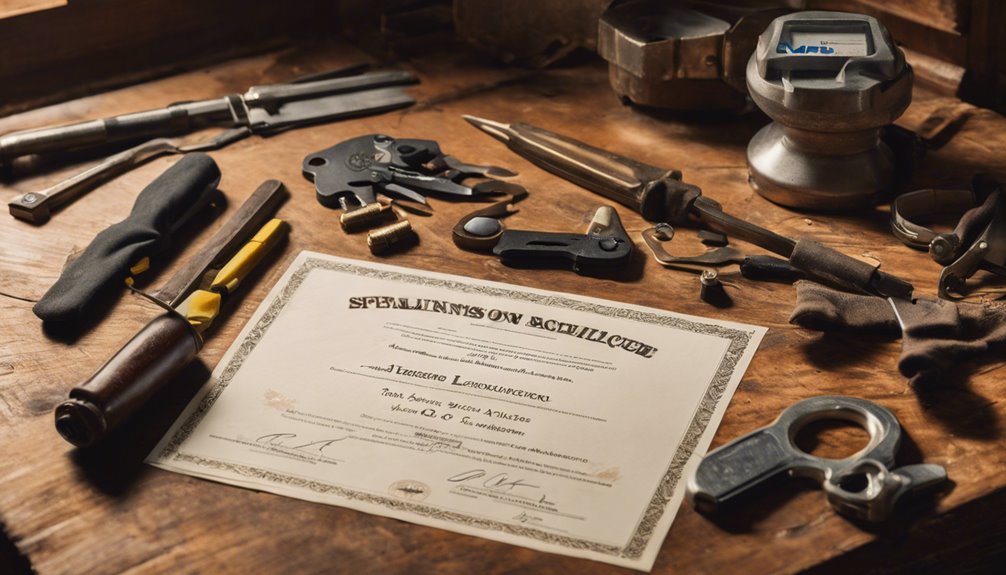
Although local regulations may seem burdensome, they play an essential role in maintaining the integrity and safety of the locksmith profession in New York. The licensing requirements enforced by the New York City Department of Consumer and Worker Protection (DCWP) guarantee only qualified individuals operate within this critical trade.
By enforcing standards such as mandatory fingerprinting and background checks, the regulations help protect clients and the community from potential malfeasance.
As a licensed locksmith, you must adhere to specific compliance measures, including keeping detailed records of your services. This not only fosters professionalism but also provides a clean audit trail in case of disputes, which can mitigate liability issues.
Furthermore, the prohibition on unlicensed activity underscores the importance of training and knowledge, discouraging unqualified individuals from jeopardizing safety.
Failure to comply with these regulations can lead to significant penalties, including hefty daily fines and potential suspension or revocation of your license. These consequences emphasize the need to operate within the legal framework, fostering a culture of accountability in the industry.
Understanding the nuances of local regulations ultimately empowers you to navigate the locksmith business with confidence. Not only do these rules protect your livelihood, but they also uphold the standards of your profession, enhancing public trust and safety.
Necessity of Professional Training
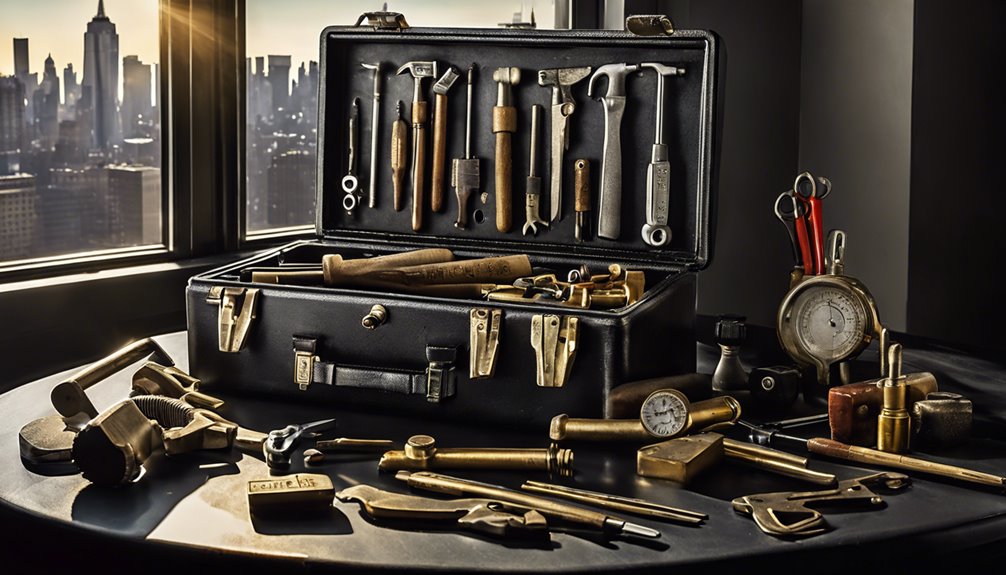
As you commence a career in locksmithing, recognizing the necessity of professional training is crucial to your success and compliance with New York's regulations. The right education not only equips you with vital skills but also guarantees you're prepared to meet the legal requirements for licensing.
- Enrollment in accredited locksmithing programs enhances your practical competencies.
- Certifications from professional organizations elevate your credibility and marketability.
- Hands-on experience under mentorship helps you navigate real-world challenges.
Locksmithing courses, such as the 900-hour Basic Locksmithing program offered by the Charles Stuart School, cover critical areas including key identification and lock installation. These courses integrate theoretical knowledge with practical exercises, assuring you gain the necessary expertise to excel in the field.
Though certifications from organizations like the Canadian Locksmith Association aren't mandatory, they're highly recommended. Obtaining these credentials keeps you informed of the latest industry standards, distinguishing you in a competitive market.
In New York, it's important to complete an accredited course and provide proof of training when applying for your license. This thorough process guarantees that only qualified professionals enter the industry, greatly reducing legal liabilities.
Participating in mentorship programs during your training allows you to learn directly from experienced locksmiths, offering invaluable insights and guidance.
Ultimately, committing to professional training isn't just about compliance; it's about empowering yourself with the skills and knowledge to thrive in locksmithing.
Records Management for Compliance

Effective records management is essential for locksmiths to guarantee compliance with New York regulations.
You need to implement stringent documentation retention practices and maintain accurate records to safeguard against legal risks.
Documentation Retention Practices
When managing your locksmith business in New York, understanding documentation retention practices is essential for compliance and liability minimization. Properly managing records helps you avoid potential legal issues and maintain a clear operational path.
- Maintain contracts and agreements for a minimum of six years post-termination.
- Securely store insurance policies and tax documents for six years and indefinitely, respectively.
- Utilize electronic storage to track and access records efficiently.
You should employ layered security measures for both physical and digital documents, ensuring sensitive information remains protected.
Implement role-based access control to limit data exposure and maintain detailed audit trails. Consider partnering with records management companies for secure, off-site storage of less frequently accessed documents.
In addition to retaining critical records, have a clear destruction policy in place. Use certified shredding services for documents that have met their retention timeline.
Mark all files with a specified destruction date. This approach not only protects your business but also enhances client trust, demonstrating your commitment to confidentiality and professionalism.
Compliance With Regulations
Understanding and adhering to regulatory compliance is critical for locksmiths operating in New York, particularly regarding records management. You must verify that your license is displayed or available for photocopy when requested, especially for off-premises work.
Remember, only licensed locksmiths can perform locksmith services; unauthorized individuals face legal repercussions.
Your responsibility extends to meticulous key management. Every key you produce must be stamped with your name, address, or license number, and duplicates of master keys require proper authorization.
Client information is paramount; document not just the client's name and address, but also their relationship to the locked item and obtain proof of ownership.
Moreover, you should retain all forms and records for inspection by authorized officials. Inspections can happen at any time, so preparation is essential.
Regular compliance checks verify that you're always operating within the law, and skipping any part of these regulations can lead to serious fines or legal action.
Ultimately, maintaining accurate records and following the regulations safeguard your business and protect your clients—allowing you the freedom to operate responsibly within a thriving profession.
Accurate Record Keeping
Accurate record keeping is an essential cornerstone of compliance for locksmiths in New York. Maintaining detailed and organized records not only protects you from legal liabilities but also builds trust with your clients.
Here are a few key reasons to prioritize your records management:
- Compliance with legal requirements helps avoid penalties.
- Organized records facilitate inspection by authorized personnel.
- Accurate documentation reinforces your credibility as a locksmith.
You must keep a record of every job, detailing the client's identity, authorization, and specific location of the item you accessed. This includes recording the date, time, and methods you used for verification.
Remember, your records should be neatly organized—preferably in a bond binder or numerically ordered sheets—and retained for at least 18 months.
Additionally, utilizing a two-part form at each job reinforces clarity. By collecting the owner's information and guaranteeing you have their explicit authorization, you're safeguarding your professional reputation.
Regular inspections will come, and being prepared with accurate records guarantees you can freely demonstrate compliance without unnecessary stress.
Frequently Asked Questions
What Should I Do After Experiencing a Liability Claim?
After experiencing a liability claim, you should act quickly. Notify your insurance provider right away to start the claim process.
Gather all necessary documentation, including job agreements and client communications. If possible, take photos of any damage.
Avoid admitting liability or making statements that could hurt your case. Cooperate with the insurance adjuster, and consult a legal advisor to assess your options.
Stay organized and focused to navigate this situation effectively.
How Does Liability Insurance Impact My Business Reputation?
Liability insurance greatly impacts your business reputation. It demonstrates your commitment to professionalism and customer care, reassuring clients that you're prepared for unexpected events.
When you have coverage, customers see you as responsible and trustworthy, which can enhance your brand image.
Additionally, in the face of claims, your insurance assures you can handle any legal issues, protecting your business from potential financial fallout that could tarnish your reputation.
Can I Work Without a License in New York City?
You can't legally work as a locksmith in New York City without a license.
Operating without one exposes you to fines ranging from $25 to $500, possible imprisonment, and ongoing penalties accumulating at $100 per day.
Beyond the monetary risks, your credibility diminishes, impacting your business and client trust.
Alternatively, obtaining a license guarantees you meet professional standards, protecting both you and your customers in the long run.
What Types of Documentation Are Needed to Apply for a License?
When you're about to open a new chapter in your career, you'll need to gather specific documents for your locksmith license application.
Start with proof of your training—certificates from accredited programs and recommendations from licensed locksmiths.
Pair those with valid photo ID, a passport-sized photo, and your social security documentation.
Don't forget the background check requirements and application fees.
Every piece is essential in forging your path toward freedom in this profession.
Are There Liability Insurance Discounts for Locksmiths?
Yes, there are liability insurance discounts for locksmiths.
You can qualify by implementing background checks for employees, conducting regular audits on your equipment, and establishing safe driving protocols.
Continuous training and professional development can also reduce risks, earning you potential lower rates.
Additionally, maintaining compliance with licensing and insurance requirements can help you secure better premiums.
Focus on these practices to enhance your business's safety and minimize your insurance costs.
Conclusion
In conclusion, addressing liability and legal risks as a locksmith in New York isn't just about compliance; it's essential for your business's longevity. For instance, if a client claims damage from improper key cutting, having proper insurance and documentation can save you from hefty costs. By investing in training, adhering to licensing requirements, and practicing clear communication, you'll not only protect yourself but also build trust with your clients, ensuring a successful locksmithing career.


